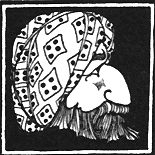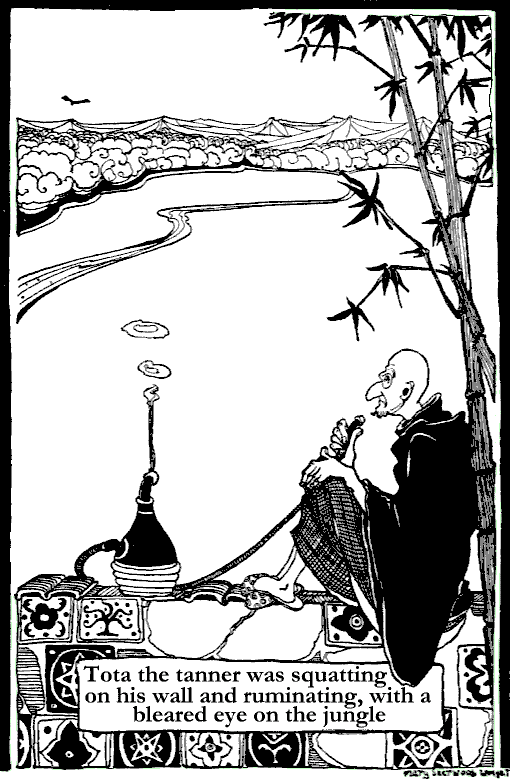 |  |
Wild at Heart Homepage | Contents | Previous Chapter
CHAPTER XI
VULTURES ALL
1

That solitary vulture, poised like a blown brown leaf above the trees, had attracted the attention of another besides Nanga.
Tota the tanner was squatting on his wall and ruminating, with a bleared eye on the jungle, when the speck appeared in the immaculate blue; and immediately the bleared eye became intent. Tota cuddled his knees and craned his head.
Sitting there, balanced precariously on the rough coping, he looked not unlike a vulture himself, for his brown pugree was thrust back from a bald and shining forehead, and his brown blanket drooped from his shoulders like a tired wing. He had all the frowzy, melancholy untidiness of the bird. His neck, too, was long and skinny; his nose protruded beak-like from a parched yellow face; and the little tuft of colourless hair on his chin bore resemblance to ruffled plumes. But most of all the eyes, bleary yet shrewd, recalled the bone-picker.

Since seeing Piri Ram home, Tota had been thinking deeply; and the sum of his thoughts, matured over a black and bubbling earthenware pipe, amounted to this: that he was prodigiously wasting his time.
There was that precious box, lying out in the jungle as if it had no more value than an old tin can on a rubbish heap, while he, Tota, was sitting on a fence and smoking his pipe! Soon the armed party would be going down there with their guns and their drums, and anybody might pick up the box. Everybody, he knew, would at least try. There would be a general scrimmage, and the box would disappear. Piri Ram would not get it; that was certain. But, then, neither would Tota. There were others whose interest in it was no less than his, but whose activity, when it came to a scrimmage, was indubitably greater.
Whereas now he would have the field to himself. A little initiative now, while all was quiet, and great would be his reward. With those deeds and papers in his hands, he would be the richest and most powerful man in Kotahbagh. How he would patronize Piri Ram! How he would repay the sneers of Lalta Pershad the bunnia! No longer would he be tied to the humble and somewhat dismal trade of flaying dead buffaloes and tanning their skins for a profit of eight annas; no longer live oppressive days with that eternal pile of stinking hides at his back door. No, he would be lording it in a two-storied house within a walled grove of orange- and mango-trees; peacocking it in the chief seats of the village council; endowing a school, maybe, or a temple or a serai, and so becoming a member of the district board and an Honorary Magistrate. To be called “Rai Bahadur Saheb” and entertained familiarly by deputy commissioners--even that was not beyond the bounds of dreams, as outlined in the blue haze of a morning’s pipe.
“Salaam, Rai Bahadur Saheb! A chair, quickly, for the Rai Bahadur Saheb! Have the kindness to be seated, Rai--”
It was at this point--the point where a deputy commissioner inquired solicitously after the health of a Rai Bahadur--that Tota saw the vulture appear in the sky.
He knew what it meant. The tiger was still on its kill; otherwise the bird would not have been content with a waiting part.
The tiger!
Counting the cost of courage, Tota stirred un easily on his wall. Sometimes, in the expansive and generous mood evoked by a glowing fire, an audience, and a full belly, he had been disposed to make light of the tiger of the Ridge. Having something of a local reputation as a shikaree,--for he had once on a dark night fired out of a tree at something which morning had revealed to his startled eyes as a full-grown leopard,--he had often insinuated that had he but a day to spare from his duty of tanning buffalo hides, he would make very short work indeed of the tiger of the Ridge. The tiger of the Ridge, he had been wont to hint, would collapse like a pricked bubble, if only--here was the rub--Tota had time.
Now he certainly had time. But such trains of thought belonged essentially to firelight, with company gathered round and murmuring, “Wah! Shabash!” at suitable intervals. To one sitting alone on a damp wall, watching the mists of morning trailing dankly over the fields, the tiger of the Ridge assumed very different proportions. So Tota, shivering and glooming, made no move in the direction of that solitary vulture. He merely watched it jealously, with a look that said, “Ah, if I too had wings!” and puffed at his pipe.
Soon, as the dew on the stones began to penetrate his blanket, his thoughts turned again to tanning, and he arose creakily--
Then it was that he saw the vulture descending in circles and finally alighting heavily among the trees.
An expression of intense satisfaction supplanted the gloom in his face. The coast was clear, and he alone knew it.
He slapped his thigh with a horny hand and walked quickly into his house.
2
The search-party, to the accompaniment of drum-beating and considerable vociferation, was recruiting itself on Piri Ram’s doorstep at the other end of the street. A small elephant, kept, on remarkably short commons, to sustain the dignity of Lalta Pershad the grain merchant, formed the nucleus of a crowd which, with the single exception of the tanner, embraced the entire population, male and female, of the village. Lalta Pershad himself, using the elephant as a temporary platform, was urging the young men to take the threefold opportunity of avenging a maiden’s death, ridding the place of a pestilence, and earning a government reward. Below, Piri Ram glowered in his doorway; and all round him men were zealous in offering the services of their neighbors in so righteous a cause. There was plenty of jostling, as unwilling recruits were pushed forward by their officious friends and dragged back, by the ears as often as not, by their womenkind.
“Shabash, brother; thy turn! The sircar gives fifty rupees for a tiger. Shabash!” Cries such as these filled the air. The dogs barked; the women cackled; the children sang and played on the outskirts, making a screen of brown dust for the crowd; and certainly no one had any eyes for the exiguous figure of Tota the mochi, strolling out of his back door far down the street.
He had a long, heavy muzzle-loader slung across his back, and a flaying-knife dangling from his neck. He picked his way quietly across the fields and slipped into the jungle, without attracting the attention of a soul.
Once inside the wood, he repented somewhat of his project. It was all so still and drowsy, and there were so many trees. His hands shook. Often the old gun went up to his shoulder at some vague alarm, and his fireside admirers would have been greatly edified at his frequent disappearance behind ant-hills. Indeed, it was only the thought of the vast wealth imprisoned in the box that prevented him from turning tail and taking his chance with the search-party.
He tried to reassure himself by thinking of the vulture. But, beyond the thought that little could now be left of the daughter of Piri Ram, the vulture gave him no comfort. True, it constituted a proof that the tiger had left the body; but that did not necessarily mean that the tiger had cleared off the premises altogether. It would be sluggish. Likely enough, it would lie up and sleep in some convenient patch of grass. Terrible thought! He might walk right on to it unawares!
After that thought, he was very careful to avoid patches of grass. He dodged from tree to tree, prepared at any moment to abandon his gun and climb for his life, till he stood in the place whence, with the others, he had first seen the box.
There it lay, leaning against a fallen bole just as he had last seen it, save that now sunlight caught it and drew gold from it, making the gimcrack thing almost beautiful. Glinting there in a self-conscious isolation among the dull dead boughs, it had a semblance of mocking personality. It seemed to wink at the old man, to say, “Here I am, all alone and unprotected. Come and take me--if you dare.” And, just as if he were conscious of the gibe, Tota eyed it lugubriously and spat. He felt positively vindictive toward the box for luring him into such an adventure.
But the contents, the accumulated pickings of an arch-swindler--he could not let them go now, not if a hundred tigers were lurking among the trees.
Pulling himself together, he examined the priming of his gun and strode forth manfully into the open.
Nothing shook the serenity of the place. The bees hummed among the leaves. A butterfly came drifting out with its curious, haphazard flight, and settled almost at his feet. Invisible birds were twittering in gratitude for the warm light. It seemed incredible that there could be any disturbing element in such a peace, and, as he neared the box, Tota surrendered himself to exaltation. It was his! his!
There was a moment of smiling triumph as he stood, looking down on it. Then, drawing a deep breath,--for it would be heavy,--he stooped to lift it.
Horror! It was open! It was empty!
Strange hoarse sounds broke the peace of that mild morning, as an angry man kicked a tin cash-box about till it cut his toes.
3
He realised, of course, what had happened. To ease her burden, the girl had emptied the box and had bestowed the contents about her person. With its contents on her person, then, she had been cut short by the tiger; and with its contents on her person, it followed, she was now being rapidly consumed by one or more vultures.
He looked up desperately. Yes, the birds were descending thick and fast now. They seemed to be making for a hollow about a quarter of a mile away, for he could see them hover and swoop over it, and hear their clumsy fluttering as they landed.
Bestial birds, he thought; they would gobble up anything! They would show no discrimination whatever in the matter of valuable papers. Even now he could only hope to recover the coin and the heavier jewellery. And for that he must run.
So, intent on finding the body of Parmala and carrying out salvaging operations without delay, he broke into a shambling, agitated trot in the direction indicated by the vultures. But he was destined to yet another surprise.
He had hardly run ten yards before he heard a little sobbing cry behind him and turned sharply, to receive, almost in his arms, the very girl whom he had thought dead.